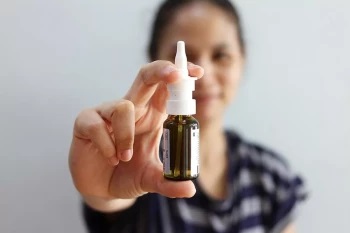Thai Study Shows That Povidone-Iodine Nasal Sprays Are Not the Least Effective As A Prophylaxis To Prevent SARS-CoV-2 Infections
Source: Medical News - Povidone Nasal Sprays For COVID-19 Aug 24, 2022 3 years, 2 weeks, 5 days, 21 hours, 48 minutes ago
A study by researchers from Mahidol University, Siam University and Samut Sakhon Hospital has found that 0.4% povidone-iodine nasal spray is not the least effective as a prophylaxis to prevent SARS-CoV-2 infections.

During the initial phases of the SARS-CoV-2 pandemic, numerous Indian scammers and Indian run companies were promoting various Povidone-iodine nasal sprays products as prophylaxis against infections by the SARS-CoV-2 coronavirus despite no actual proven vivo studies. Some initial vitro studies conducted in Singapore and also Connecticut were actually funded by companies with a vested interest to promote povidone usage and products and the study data was basically skewed.
In fact, Thailand
Medical News had already warned as early as November 2020 in an article that usage of Povidone-iodine intranasal sprays can actually damage certain nasal mucosal cells and actually cause more serious susceptibility to the SARS-CoV-2 virus and other respiratory viruses as povidone is also cytotoxic to some of these cells found in the nose.
https://www.thailandmedical.news/news/yet-another-covid-19-prophylactic-intranasal-spray-debuting,-this-time-by-university-of-birmingham
In this recent research in Thailand, the study team analyzed the virucidal efficacy of 0.4% povidone-iodine (PVP-I) nasal spray against SARS-CoV-2 in the patients’ nasopharynx at 3 minutes and 4 hours after PVP-I exposure.
The study team utilized an open-label single-arm pilot study of adult patients with RT-PCR-confirmed COVID-19. All patients received three puffs of 0.4% PVP-I spray in each nostril. Nasopharyngeal (NP) swabs were collected before the PVP-I spray (baseline, left NP samples), and at 3 minutes (left and right NP samples) and 4 hours post-PVP-I spray (right NP samples).
All nasal swabs were tested by RT-PCR and cultured to measure the viable SARS-CoV-2 within 24 hours after collection.
A total of fourteen patients were enrolled in the study but viable SARS-CoV-2 was cultured from 12 patients (85.7%). The median viral titer at baseline was 3.5 log TCID 50 /mL (IQR 2.8-4.0 log TCID 50 /mL). At 3 minutes post-PVP-I spray via the left nostril, viral titers were reduced in 8 patients (66.7%). At 3 minutes post-PVP-I, the median viral titer was 3.4 log TCID 50 /mL (IQR 1.8-4.4 log TCID 50 /mL) ( P =0.162). At 4 hours post-PVP-I spray via the right nostril, 6 of 11 patients (54.5%) had either the same or minimal change in viral titers. The median viral titer 3 minutes post-PVP-I spray was 2.7 log TCID 50 /mL (IQR 2.0-3.9 log TCID 50 /mL). Four hours post-PVP-I spray the median titer was 2.8 log TCID 50 /mL (IQR 2.2-3.9 log TCID 50 /mL) ( P =0.704).
During the course of the study, no adverse effects of PVP-I nasal spray were detected.
The study findings demonstrated that 0.4% PVP-I nasal spray demonstrated minimal virucidal efficacy at 3 minutes post-exposure. At 4 hours post-exposure, the viral titer was unchanged from baseline.
The study team concluded that the poor virucidal activity of 0.4% PVP-I nasal spray is unlikely to reduce transmission of SARS-CoV-2 if used for prophylaxis.
/>
The study findings were published on a preprint server and is currently being peer reviewed.
https://www.medrxiv.org/content/10.1101/2022.08.18.22278340v1
In India, Pakistan, Bangladesh and Philippines, many scammers including 'garbage' physicians are still promoting the usage of povidone intranasal sprays as a prophylaxis against the SARS-CoV-2 virus, putting the lives of many at risk.
In fact, most of other proven intranasal sprays that were being used as a prophylaxis against the SARS-CoV-2 virus including budesonide sprays, xylitol and carrageenan sprays, berdazimer sodium sprays, fucoidan sprays, azelastine sprays, heparin sprays and also mometasone furoate sprays are no longer effective against the Omicron variants and newly emerging variants.
For more on Prophylactic Intranasal Sprays For SARS-CoV-2, keep on logging to Thailand
Medical News.
